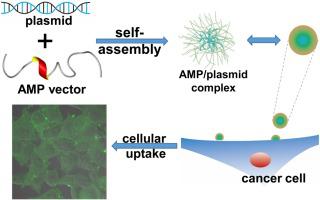Colloids and Surfaces B: Biointerfaces ( IF 5.4 ) Pub Date : 2021-08-27 , DOI: 10.1016/j.colsurfb.2021.112069 Yue Li 1 , Yue Sun 2 , Weibing Dong 2 , Chengdong Zhu 3 , Yue Guan 1 , Dejing Shang 2

|
Antimicrobial peptides/DNA complexes were designed based on AMPs chensinin-1b and its corresponding lipo-chensinin-1b conjugated with an aliphatic acid with different chain lengths and therapeutic genes. The main goal of such a complex includes two aspects: first, antimicrobial peptides deliver therapeutic genes to cancer cells and genes expressed in targeted tissue for cancer gene therapy, and, second, the antimicrobial peptide kills cancer cells when used alone as an anticancer agent. This study presents a model composed of chensinin-1b and its lipo-chensinin-1b and eGFP plasmids, which were used as reporter genes, and the final peptide/eGFP plasmid complexes were analyzed by TEM and DLS. The gene transfection efficiency of the complex was evaluated by a microplate reader, FACS and CLSM. Compared with Lipo2000, the antimicrobial peptide showed specific selectivity for transfection against cancer cells and mammalian cells. The peptides chensinin-1b and lipo-chensinin-1b binding with the eGFP plasmid displayed optimal transfection efficiencies at a mass ratio of 8. In addition, PA-C1b can deliver p53-eGFP plasmids into MCF-7 cancer cells, and the proliferation of cells was inhibited and even caused cell death. Overall, PA-C1b was screened and found to have the highest transfection efficiency for gene delivery and good cellular uptake capability. The in vivo transfection ability of PA-C1b was investigated using a tumor-bearing mouse model, and the transfection efficiency reflected by the fluorescence of expressed GFP was determined by in vivo imaging. Conclusively, the antimicrobial peptide PA-C1b could be used as the nonviral vector with high efficiency for cancer gene therapy.
中文翻译:

用于癌症治疗中有效基因传递的抗菌肽-质粒 DNA 载体制剂的酰化
抗菌肽/DNA复合物是基于AMPs chensinin-1b及其相应的lipo-chensinin-1b与不同链长的脂肪酸和治疗基因缀合而设计的。这种复合物的主要目标包括两个方面:首先,抗菌肽将治疗基因传递给癌细胞和在靶向组织中表达的基因用于癌症基因治疗;其次,抗菌肽单独用作抗癌剂时可以杀死癌细胞。本研究提出了一个由 chensinin-1b 及其 lipo-chensinin-1b 和 eGFP 质粒组成的模型,用作报告基因,并通过 TEM 和 DLS 分析最终的肽/eGFP 质粒复合物。通过酶标仪、FACS 和 CLSM 评估复合物的基因转染效率。与 Lipo2000 相比,抗微生物肽对癌细胞和哺乳动物细胞的转染显示出特异性选择性。与 eGFP 质粒结合的肽 chensinin-1b 和 lipo-chensinin-1b 在质量比为 8 时表现出最佳转染效率。 此外,PA-C1b 可以将 p53-eGFP 质粒递送到 MCF-7 癌细胞中,并且细胞受到抑制甚至导致细胞死亡。总体而言,PA-C1b 被筛选并发现具有最高的基因传递转染效率和良好的细胞摄取能力。使用荷瘤小鼠模型研究了PA-C1b的体内转染能力,并通过体内成像确定了表达GFP的荧光所反映的转染效率。最后,









































 京公网安备 11010802027423号
京公网安备 11010802027423号